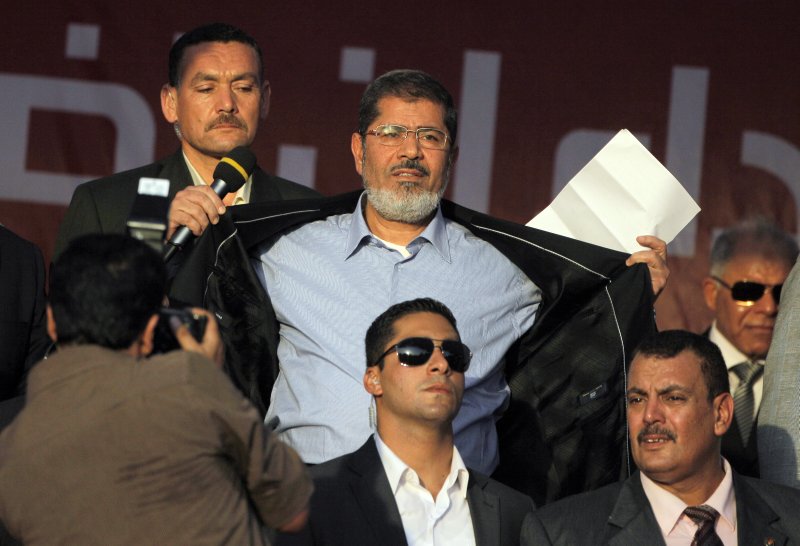
(Photo: AP)
The sudden collapse and death of former Egyptian President Mohammed Morsi in a Cairo courtroom this week was a brief rallying point for the Muslim Brotherhood, an Islamist movement that has seen its influence steadily wane across the Mideast since Egypt’s military ousted Morsi in 2013.
Seven years ago, in the still hopeful aftermath of the Arab Spring, Morsi took the podium in front of hundreds of thousands in Cairo in 2012 as the first freely elected president of Egypt, and opened his jacket to show he wore no bulletproof vest.
At that moment, the Brotherhood leader embodied the rise of the Islamists in the Middle East. Morsi wanted to prove he was one with the throngs in Cairo’s Tahrir Square — protesters who the year before had brought down longtime autocrat Hosni Mubarak.
But the Brotherhood was seen by many as opportunistic, riding on the popular revolt’s coattails to grab power in a nation where the group’s members had been ruthlessly suppressed or at best tolerated, if they stayed on the political fringes.
A year later, Morsi was overthrown and incarcerated with other Brotherhood leaders. The movement was outlawed as a terrorist group, and hundreds of its supporters were killed by security forces in a clampdown in 2013.
Islamists, or those who seek political power in line with the laws of Islam, are pariahs in the region today. Notable exceptions include Turkey, Qatar and the Gaza Strip, controlled by Hamas — a Palestinian offshoot of the Brotherhood.
Egypt and its Gulf allies are determined to keep cracking down on groups like the Brotherhood and crush any popular support for them.
The long-running enmity between the Brotherhood and most Sunni-led governments highlights the deep divisions among Sunni Muslims. It adds a further complication to the volatile region, where the split between Sunnis and Shiite Muslims has created rival camps, led by Saudi Arabia and Iran, who are engaged in proxy wars in Syria and Yemen.
TURKEY, KHASHOGGI AND SAUDI ARABIA
In a telling comment Thursday, Turkish President Recep Tayyip Erdogan connected the death of Morsi to the brutal killing of Saudi columnist Jamal Khashoggi, who was slain at the Saudi Consulate in Istanbul in October.
“In the same way that we didn’t allow the murder of the late Jamal Khashoggi to be forgotten, we will never allow Morsi’s drama to be forgotten,” Erdogan said.
Egypt’s state TV said Morsi died of a heart attack in court, while Erdogan alleged that the deposed president was killed. Erdogan claimed, without any proof, that Morsi allegedly “flailed” in a Cairo courtroom for 20 minutes on Monday and that nobody assisted him.
Erdogan’s Islamist ruling party was a key ally of Egypt’s Brotherhood. Since Morsi’s ouster, relations between Ankara and Cairo have plummeted with acrimonious exchanges.
Erdogan’s mention of Khashoggi did not seem to be a coincidence. Saudi Arabia had long agitated against the journalist as a Brotherhood activist and sympathizer, a claim denied by those close to Khashoggi.
A united front against the Brotherhood has made strong allies of Saudi Arabia’s Crown Prince Mohammed bin Salam and Egypt’s President Abdel-Fattah el-Sissi. Both leaders have been able to pursue internal and external agendas, including against Islamists, without any fear of admonishment or sanction from Washington.
QATAR
The Gulf nation fell out in a spectacular and bruising way with its Gulf Cooperation Council neighbors and Sunni brethren in the last two years. Led by Saudi Arabia, but also bringing in Egypt on its side, the countries cut diplomatic relations with Doha. This included barring Qatari planes from their air space. There were accusations that Qatar was supporting terrorism in the region, including al-Qaida-linked groups in the Syrian war. But Saudi Arabia has also faced allegations of supporting extremism in the region when it suits its own purposes.
At the crux of the fraternal dispute, however, was Qatar’s Al-Jazeera. The news station, like its ruling family owners, had shown strong support for Egypt’s Muslim Brotherhood and has subsequently highlighted Saudi transgressions.
This has been especially acute with the killing of Khashoggi and the civil war in Yemen, which pits a Saudi-led Gulf coalition against Iranian-backed rebels, the Houthis. The fighting has killed more than 90,000 people since 2015 and created the world’s worst humanitarian crisis.
HAMAS
Although the militant Palestinian group is defined by its resistance to the state of Israel, it does so based on a strict Islamist philosophy. Its natural allies have been Turkey, Qatar and Egypt’s Brotherhood. Hamas has been part of that movement but has taken measures in recent years to reconcile with the current Egyptian authorities. This stems from the desperation of the Gaza blockade, enforced by land, sea and air by Israel, but also by Egypt along the coastal strip’s southern border. Israel and Egypt began blockading Gaza after the 2007 Hamas takeover of the territory.
Qatar for its part continues to be one of the biggest donors to Hamas. A Qatari envoy delivered $25 million to the Gaza Strip this week to help shore up a fragile cease-fire between Israel and Hamas. Adding to the mix, Shiite Iran also supports Hamas and sent its condolences over Morsi’s death earlier this week to the group and the Egyptian nation, including “wishes for divine blessing and mercy” for Morsi.


